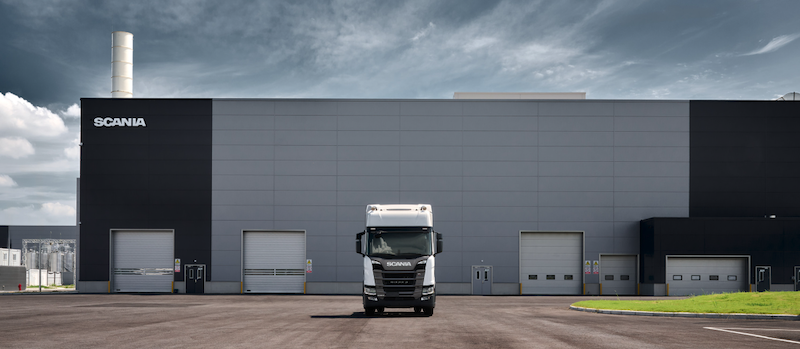Swedish truck maker Scania has taken what it describes as “a momentous step in its 134-year journey” by inaugurating its third global industrial hub, in China.
The company says that this investment not only strengthens Scania’s global footprint but positions the company “at the heart of the world’s largest truck market”.
The new industrial hub in Rugao, Jiangsu Province, represents one of Scania’s largest global investments to date.
Covering 800,000 square metres, the site has a licensed production capacity of 50,000 vehicles a year and will serve both the Chinese market and selected export markets in Asia and beyond.
The facility creates around 3,000 new jobs locally and represents a total investment of €2 billion.
Scania is the first western original equipment manufacturer to be granted a full production licence for a wholly owned truck plant in China, a milestone that underscores the company’s long-term commitment to the market.
The Rugao facility will operate almost entirely on renewable energy sources, including locally produced biogas and certified green electricity. These measures contribute directly to Scania’s Scope 1 and 2 decarbonisation targets.
Ruthger de Vries, president of Scania industrial operations Asia, says: “Sustainability is built into every part of our new factory in Rugao: from energy sourcing to waste management.
“This is not just about producing trucks; it’s about setting a new benchmark for efficient and sustainable industrial operations.”
Scania has been present in the Chinese commercial vehicle market for the past 60 years. China is the world’s largest truck market and a global centre for innovation in transport, connectivity, autonomy and electrification.
With the new industrial hub, including R&D centres in Rugao and Shanghai, Scania strengthens its local footprint and its ability to jointly develop solutions with Chinese partners.
The strategic investment brings Scania closer to customers in China and across Asia, enabling faster deliveries, wider specification options and deeper collaboration.
Christian Levin, president and CEO of Scania and Traton Group, says: “Our establishment in Rugao is more than a factory; it will be part of China’s dynamic innovation landscape and fuel Scania’s own development.
“By also producing and innovating locally, we can tap into China’s speed and creativity, strengthen our global capabilities and accelerate the shift towards sustainable transport.”
Scania introduces dual commercial offering for the Chinese market
The new industrial hub is designed to be part of the Traton Modular System (TMS), which enables Scania and Traton Group brands to efficiently scale, tailor, and innovate across markets, customer demands and product portfolios.
TMS allows for integration of unique Chinese technologies and applications that will strengthen local and global competitiveness.
Two commercial offerings are planned: firstly, Scania, built to its global high standard and customisable for demanding applications – both tractors and rigids, with a wide range of service portfolios.
Secondly, in addition to the global Scania offer, a new tractor product range – “Next Era” – developed specifically for China’s competitive long-haul and volume segment.
The Next Era product line represents a new chapter in Scania’s commercial offering, developed specifically for the Chinese market and fully integrated with the local digital ecosystem.
While sharing its DNA with the Traton Modular System, it is designed for high-volume transport applications, with a standardised product and service portfolio. The TMS also allows unique technologies to be introduced in China first and then rolled out globally.
Deliveries from production in Rugao will begin in late 2025 and Next Era will be launched in the first half of 2026.

